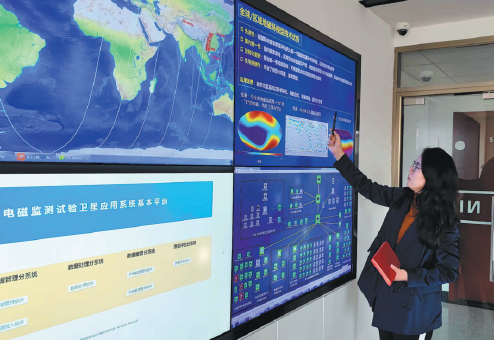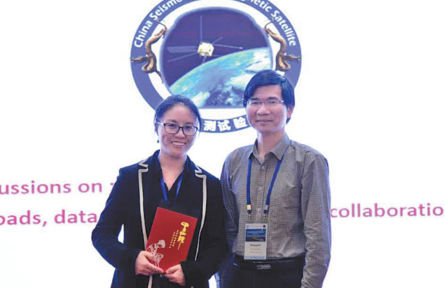A career built on shaky ground
Scientist dedicated to studying earthquakes hopes to be able to predict them one day, report Yuan Quan and Jia Zhao.
Many people, when asked to picture a woman of the Tibetan ethnic group, will conjure up images based on tradition. These could involve a weaver, a shepherdess or someone who performs folk dancing in music videos. However, Zeren Zhima does not conform to any of these stereotypes.
She is often spotted carrying a heavy laptop with complicated diagrams and bell curves displayed on screen. She spends hours every day typing computer code and processing mass data received from a satellite more than 500 kilometers away.
Despite her origins in a remote area of the Tibetan countryside in Southwest China's Sichuan province, Zeren Zhima now works at the cutting edge of modern science, specializing in the physics of Earth and space.
Working at the National Institute of Natural Hazards, she is the chief designer of the application system for China's first seismo-electromagnetic satellite, Zhangheng-1. In service for five years, the satellite, which is named after the inventor of an ancient Chinese seismograph, has provided a large amount of scientific data on earthquakes around the globe.
Before a quake occurs, rock or tectonic plate movements deep below ground generate electromagnetic waves, which can travel through the air and even space. The satellite was designed to capture the electromagnetic signals.
By analyzing the data, scientists can trace the electromagnetic circumstances of previous ruptures and identify natural laws that will eventually help forecast impending quakes.
Using a space satellite to measure the shaking of the Earth's surface can also be challenging. Some countries have launched similar satellites before, but they have all been retired from service. Zeren Zhima says it may take years before scientists can realize the goal of predicting earthquakes.
The desire to perform good deeds was nurtured in Zeren Zhima from an early age. She was born into a rural family in Garze Tibetan autonomous prefecture, Sichuan, in 1976. At that time, local women were destined to do farm work. But her parents did not want her to be reconciled to such a life. Her father, a voluntary schoolteacher, made sure his two daughters studied hard so that they could leave the countryside.
She did not let her parents down. In her county's school graduation exams, she scored the highest marks, and was admitted to a college in Beijing specializing in disaster prevention technology.
Her hometown is located in a zone prone to natural disasters, such as quakes, forest fires and landslides. She witnessed some terrible catastrophes in her youth.
"My parents always taught me to give a helping hand when people are in trouble," Zeren Zhima says. "I think that pursuing studies in disaster prevention means putting this idea into practice, which can benefit a lot of people."
However, coming from a simple rural environment, it took her some time to adapt to modern urban life. "I didn't know how to use a telephone or how to take the subway," Zeren Zhima says, recalling her early years in Beijing.
The fact that she has dyslexia and, at the time, she could not speak Mandarin very well, meant that she had to work twice as hard to succeed.
She practiced Mandarin pronunciation by reading newspapers out loud for hours, and immersed herself in piles of tapes and books to hone her English listening and speaking skills. With two years of hard work, she became a straight-A student.
In 1999, Zeren Zhima took her next step, pursuing a bachelor's degree at the Guizhou Normal University in Southwest China. She majored in computer science, a popular subject back then due to the rise of the internet. She was good at math and English, and got offers for web engineering jobs from several foreign companies, but she turned them down and chose instead to study geophysics at the Chinese Academy of Sciences.
At the country's highest academic institution in natural sciences, the workload was heavy. However, what kept her going was her original aspiration to devote her life to the welfare of others.
She received her master's degree in 2005 and found a job at the Institute of Earthquake Forecasting of the China Earthquake Administration.
Three years later, an 8.0-magnitude earthquake hit Wenchuan county, Sichuan, causing widespread devastation. The Zhangheng-1 project, which was still in development and had been paused, was moved up the agenda once more.
In 2009, she took on two challenges, becoming a key member of the research project while giving birth to a baby girl. She was able to balance the duties of mother and scientist largely due to the support of her family, with the mother-in-law taking on some childcare tasks.
Aware of the need for an interdisciplinary background, Zeren Zhima began to apply for doctoral studies in astrophysics.
Juggling motherhood with in-depth research, on her third attempt, in 2014, she finally obtained her PhD from Beihang University in 2014.
In her senior thesis, she thanked her parents-in-law, husband and daughter, saying that her family had provided the strong support necessary for her career.
The Zhangheng-1 satellite was launched in February 2018. Over the past five years, it has racked up numerous achievements, including obtaining global electromagnetic field data, strengthening the monitoring of weather events, and offering support for research into earthquake forecasting.
Her team is now planning the second Zhangheng satellite, which will be followed by others that will eventually form a constellation of satellites.
She stresses that scientific research needs to be practical and realistic. Forecasting earthquakes is fundamental research requiring patience and persistence.
"We would rather spend decades on the research than rush ahead seeking quick results," she says.
The Wenchuan earthquake occurred on May 12, 2008. Since then, National Disaster Prevention and Reduction Day has been observed each year on May 12. The room number of her office is 512, a number picked out by the previous leader of the project. She says it acts as a reminder of her mission to help predict earthquakes and prevent such disasters in the future.
As the International Women's Day was celebrated on Wednesday, Zeren Zhima's story has come under the spotlight, providing an example of the varied and important work women are doing in the modern world.
In pondering the reasons for her success, she says that she keeps her sights on "surpassing my previous self and fulfilling my potential".
She is also mindful of her parents' priceless guidance on the value of doing things for the wellbeing of others.
"I am glad of having a science career that can protect people's lives and safety," Zeren Zhima says.
Xinhua
















